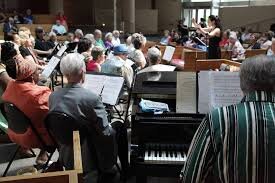Featured Partner: NYU Family Support Program Goes Virtual
Featured Partner: NYU Family Support Program Goes Virtual
by Corey Bliss
Just how quickly did the NYU Alzheimer’s Disease and Related Dementias Family Support Program move online when the pandemic hit? “We pivoted in one day,” says Dr. Mary Mittelman, DrPH, the Program’s Director since its inception in 2016, and a research professor in NYU Langone’s Department of Psychiatry. “We had our last in-person session on March 12th, and our first online session on March 13th.”
Dr. Mary Mittelman
Supported by a grant from New York State, the NYU Family Support Program provides consultation, resources, support services and education, free of charge, to family caregivers in the five boroughs of New York City. “It’s an outgrowth of the NYU Caregiver Intervention study,” explains Dr. Mittelman, “which demonstrated the value of comprehensive, ongoing support from family and friends for people with dementia and their caregivers. This improved caregiver wellbeing, and thereby helped them to keep the person with dementia home with them far longer than they otherwise could.”
All of the Program’s services are now available online, from individual and family counseling and support groups, to social gatherings such as virtual museum visits and monthly memory cafés. “Once they enroll,” says Dr. Mittelman, “they have a menu of options of ways to get counseling and support and connection to people like themselves, whether they’re people with dementia or their caregivers.”
Resources include a variety of specialized support groups, such as Caregiving From Afar, “and ‘afar’ can be around the corner now,” quips Dr. Mittelman. Educational webinars about specific care needs and emerging research are a way for family caregivers to broaden their knowledge and learn new approaches to care. In keeping with its holistic approach and commitment, the Program offers bilingual services (English and Spanish), funds grants for short-term caregiver respite, and even connects members to bereavement resources when the time comes.
“If I could wave a magic wand, I would want to connect people in the earliest stages of dementia with a program like ours.”
–Dr. Mary Mittelman
A Place for Us is a hallmark of the Program, led by recreation therapist Amy Harris, CTRS. Until the pandemic, the program was offered as a caregiver respite program at different community locations around the city. It was a space where people in the early stages of dementia could have, in Dr. Mittelman’s words, a “stimulating, enjoyable and normative activity” centered around the creative arts – visual art, movement, music and more — while their caregivers were able to get much-needed respite.
Now that programming has gone virtual, A Place for Us is more popular than ever. Free of the restrictions of having to travel to different locations, many people now participate every single day – compared to once a week pre-pandemic. “What was amazing to me was the amount of interaction among the participants online,” says Dr. Mittelman after sitting in on a recent gathering. “They were looking at a piece of art and one person would say ‘I see this’ and another person chimes in."
That increased accessibility and consistency are clear silver linings of our new reliance on online learning and support. Creating meaningful daily experiences, particularly for those with complex needs, is crucial during this time of social isolation. As Dr. Mittelman points out, “there are many situations where it’s actually more convenient” to join a virtual program. “And for people with hearing difficulties, it may be better to be able to interact with someone online, without a mask.”
The Unforgettables Chorus.
In addition to its events and gatherings funded by the state’s grant, the Program is connected to many other community resources, most notably the Unforgettables chorus, which Dr. Mittelman founded in 2011. This chorus for people living with dementia and their caregivers is funded by private donations. Two different groups each meet and rehearse virtually once a week, with as many as 75 people participating - many of whom are also part of the NYU Family Support Program.
The Program is a hidden gem for New York City residents facing challenges in caregiving for and living with Alzheimer’s disease and related dementias. “As long as someone in the core caregiving network lives in New York City, they’re eligible for our services,” explains Dr. Mittelman. That includes the person living with dementia, their primary family caregiver, or another close family member.
For Dr. Mittelman and her team of 15 dedicated staff - including six social workers, three community health representatives, a recreation therapist, two coordinators of museum visits and other special programs, and administrators - advocating for early intervention is a key part of their mission. In Dr. Mittelman’s words, “We’d like to see more people who are caring for relatives or friends in the early stages of dementia take advantage of our services in a preventive way, so that they will be able to cope with symptoms as they arise, and have a community to turn to.”


